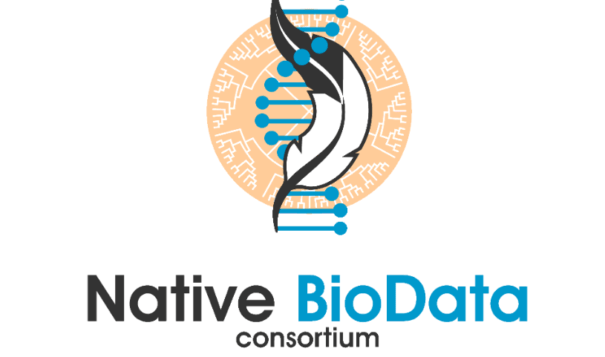Press Release
In landmark decision, NIH awards $9 million for Indigenous Tribal Data Repository (RADx TDR) led by Native research institute to improve health in Indian Country
 Native BioData
Native BioData
EAGLE BUTTE, S.D. December 1, 2023–Today the National Institutes of Health (NIH) announced funding for an Indigenous Data Repository led by Native scientists to help improve health in tribal communities and for all Indigenous peoples. After a competitive review, Stanford University in collaboration with Native BioData Consortium (NativeBio) was awarded $9 million to fund an Indigenous-led effort called Rapid Acceleration of Diagnostics Tribal Data Repository (RADx TDR): Data for Indigenous Implementations, Interventions, and Innovations (D4I). The Native BioData Consortium is the first Indigenous led, 501(c)(3) nonprofit biodata repository and research institution in the geographic borders and legal jurisdiction of a Tribal Nation, the Cheyenne River Sioux Reservation. NativeBio will work with five scholars at premier research universities and at 10 health sites using Native American public health data to help design ethical approaches to data sharing, data analysis, implementation, policy, and legal frameworks. The goal is to more immediately serve Tribal populations following the disproportional impact of COVID-19 in Indigenous communities.
The award is a landmark decision in support of Indigenous peoples. Joseph Yracheta, M.S., (Pūrepecha), executive director of NativeBio said, “In recognition that science development projects are increasingly done as public-private partnerships, we recommend that formal and informal standards include and adhere to 21st century precepts of equity, restorative justice, and benefit sharing, acknowledging the 532 years of injustice done to Native Americans and their inability to correct the problem on their own.”
Ryman LeBeau, chairman of the Cheyenne River Sioux Reservation (CRSR) also praised the award. “This is a huge step forward for all of Indian country. We are finally acknowledged for what we have known all along. Tribal Nations have the ability and capacity to administer health, education, and economic programs for ourselves.”
The RADx Tribal Data Repository comes in response the NIH initiative, called Rapid Acceleration of Diagnostics for Underserved Populations (RADx®-UP) launched during the COVID-19 pandemic to “speed innovation in the development, commercialization, and implementation of technologies for COVID-19 testing.” RADx-UP enabled a targeted public health response to COVID-19 and helped to identify and address disparities in COVID-19
diagnostic testing and effectiveness among underserved and vulnerable populations. American Indian and Alaskan Native (AI/AN) communities acutely felt the devastating consequences of COVID-19, partly due to the increased prevalence of underlying chronic conditions caused by systemtic neglect and underfunding of tribal health services.
“Though apparent, the true extent of COVID-19 disparities among Indigenous people is likely underestimated,” Yracheta said. “This is mostly because of underreporting in the absence of a unified, Indigenous-led data resource to facilitate data collection, interagency cooperation, guide COVID-19 research, and subsequent implementations.”.
The full RADX Tribal Data Repository team includes Stanford University, as the prime awardee and project administrator and Native BioData Consortium as the project leader. The project will be guided by NativeBio consortium members from the University of Wisconsin-Madison, The Ohio State University, the University of California-Santa Cruz, Arizona State University, and the University of Washington-Seattle.
Stanford and NativeBio have worked together for more than 10 years. “Stanford believed in our vision to establish an Indigenous biorepository and research institute on Native American land led by Indigenous scientists,” Yracheta said. “Stanford’s help was pivotal to our success today.”
Michael Synder, Ph.D., chair of Stanford’s Department of Genetics, said, “This is a major milestone. NativeBio is the first repository fully owned and managed by Native Americans which is crucial given they are a sovereign nation. NativeBio has been at the forefront of state-of-the-art technologies for storing and maintaining biosamples and data. This award will enable them to continue to do so and serve as an important and central hub for Native American data.”
Although only 1% of university professors in the U.S. are Native American, almost half of the RADx Tribal Data Repository university teams are led by Indigenous faculty scientists including Krystal Tsosie, Ph.D. (Diné – Navajo) and Matt Anderson, Ph.D. (Eastern Band of Cherokee descent).
Dr. Tsosie is a NativeBio cofounder and assistant professor at Arizona State University. “We started NativeBio with a very simple premise, that research on Indigenous peoples’ samples should be led by Indigenous community members and Indigenous scientists. So, ‘for us, by us’ has been our motto,” Tsosie said. “Who is better than community members to drive researcher questions and to understand the data? Sometimes outsiders fail to understand other factors that contribute to disparities and health inequities outside the research samples.”
Matt Anderson, Ph.D., associate professor in medical genetics at the University of Wisconsin-Madison, said, “The RADx D4I initiative points to the need for tribal sovereign protection of Indigenous data that has been missing since the inception of federal scientific programs. Scientists are accountable to Indigenous people in the use of Tribal data, and NativeBio is accountable to Indian Country as being good stewards of their data. This approach models systems and understandings that more closely align with indigenous mechanisms of community responsibility. “
NativeBio Data is an Indigenous and independent 501 (C)(3) non-profit data repository and research institute founded in 2018 in Eagle Butte, South Dakota on the Cheyenne River Sioux Reservation. NativeBio is the first Indigenous genomic biorepository led by Natives and located in a sovereign American Indian Nation.
Dateline:
EAGLE BUTTE, S.D.
